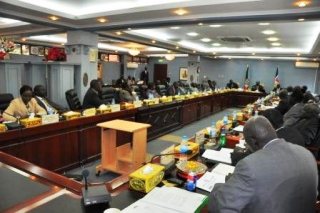S. Sudanese political parties query cabinet’s decision to cancel poll
February 20, 2015 (JUBA) – The alliance of South Sudanese political parties have questioned the legitimacy of the cabinet after it proposed the cancellation of the 30 June elections.

“The government has no constitutional or legal authority to cancel the conduct of the elections. The only two sections in the law that allow postponement of elections by NEC [National Elections Commission] are 57 and 150 for only 60 days and for specific reasons none of which applies in this case,” partly reads a statement from the parties.
According to the group, law are in place to protect democracy from any government that may decide to interrupt elections whenever it feels it may be losing the contest.
“Therefore, the decision of the Council of Ministers has no basis in the constitution and the law and was an attempt to preempt the court procedures in a way that bypasses the law,” stressed the alliance of political parties.
“Hence, the only authority that can cancel the elections remains the Supreme Court,” it added, weeks after successfully petitioning the High Court to nullify NEC’s decision to conduct the June elections.
The High Court fixed 3 March as the date for hearing the election petition.
The political parties’ alliance, in their statement, further accused the current government of allegedly failing to deliver basic services to the population, saying its era in office has been characterised by “rampant corruption in which billions of our oil money lined the pockets and swelled the bank accounts of government ministers and senior officials with their business associates”.
“Such an inefficient government and a rubber-stamp parliament do not deserve to stay in power for a single day beyond the term of office stipulated for them in the Constitution,” further reads the 16 February release.
The South Sudanese government and its armed opposition faction are currently involved in series of negotiations on a proposed transitional government under the mediation of the Intergovernmental Authority on Development (IGAD) regional leaders.
The alliance of parties, however, said the formation of interim administration could only occur in the event that an all-inclusive peace agreement is signed and incorporated in the transitional constitution or when the two main warring parties to the conflict have failed to reach any peaceful settlement.
“The first option, and the most ideal, is when a peace agreement negotiated through an inclusive process has been reached. The peace agreement shall then be incorporated into the current Constitution so that the Transitional Government of National Unity assumes office by 9 July 2015 for a period of 30 months,” the group said.
“The second option shall only be considered if the upcoming peace talks in Addis Ababa fail to be conclusive by the date set. Then and only then, shall all the political forces in the country together with the civil society in its broad definition convene a national conference to discuss the road map for the country after 9 July 2015 when the mandate of the current government would have come to an end,” they added.
(ST)
